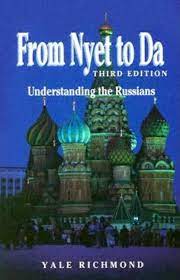Yale Wolf Richmond
A TRIBUTE ON THE PASSING OF ONE OUR COUNTRY’S FOREMOST CULTURAL DIPLOMATS
Today’s Washington Post carries the sad news of the passing of one of our country’s foremost cultural diplomats: Yale Richmond.
Yale’s geographic area specialization was Russia and Central Europe. When he began working in the region, Russia was still the Soviet Union and the US referred to anything east of the Soviet Union as Eastern Europe. This deeply offended the Poles, for example, who pointed out that Warsaw was to be found some to 1000 miles west of Moscow, just about mid-way between Moscow and Paris. The Poles would point out that they were central Europeans whose culture came from the west not from the influences of the barbarism found along their eastern border.
Yale quickly recognized that the Russian people and people of other ethnic origins living in the Soviet Union, and across central Europe, harbored no natural anti-American instincts and that they were highly receptive to opportunities that might allow them to learn English and perhaps even to visit or to study in our country. And Yale saw that the Communist governments of the Soviet Union and of at least some Central European countries (Poland, Romania, and Yugoslavia) were willing, if not anxious, to work on expanding educational and cultural relations with our country.
So both on assignments in the field in Moscow and Warsaw and while serving in Washington supervising educational and cultural operations in this region, he began to gather U.S. Government resources for such efforts.
Yale worked tirelessly to educate younger staff, such as myself, on the diplomacy needed for such activities: language ability and a thorough knowledge of the history of these countries. We were exhausted after his intense visits to us in the field. He was indefatigable.
But perhaps the highest tribute that has been paid to Yale has come about most recently and in an very perverse manner: while Soviet leadership was anxious to support educational and cultural exchanges because it believed that this demonstrated that it considered such activity part of how civilized nations carried on relations with one another, the Putin regime has now shut down all such activities, declaring that young people who participate in such programs are brainwashed while they are in the U.S. and return enemies of Russia. The Soviets had the self-confidence to believe that their system could compete successfully with the outside world. Putin has no such confidence.
Yale was right. He supported language teaching and other efforts to expand academic and cultural contacts because he understood how deeply corrosive they were to totalitarian regimes. And now the Putin regime certainly recognizes this.
Perhaps no other person contributed more over a lifetime to helping Americans to understand the world beyond our borders and those beyond our borders to understand us.
We mourn the passing of our one of our country’s foremost cultural diplomats. But he leaves a superb road map for how we will need to rebuild our international relations in the future.
Ambassador Robert R. Gosende
3/29/2020

Mr. Richmond served in Germany, Laos, Poland, Austria, and the Soviet Union. For his service in Laos, he received the U.S. Information Agency’s Meritorious Service Award. At retirement in 1980, he was a Deputy Assistant Director (Europe) of the U.S. Information Agency. After retirement, he was a Staff Consultant to the Commission on Security and Cooperation in Europe and the U.S. Congress, and a Senior Program Officer at the National Endowment for Democracy.
A specialist in educational and cultural exchanges with the Soviet Union and Eastern Europe, he established the Fulbright program in Poland in 1959 and negotiated fourteen intergovernmental agreements with the Soviet Union and the countries of Eastern Europe on exchanges in education, culture, science, and technology. For his work in Poland, he was awarded the Commander’s Cross of the Order of Merit of the Republic of Poland.
After a 30-year career as a cultural officer helping people of other countries to understand America and its people, Mr. Richmond in his retirement wrote 11 books to help Americans going abroad to work or study to better understand the culture and people of other countries. He was the author of From Nyet to Da: Understanding the New Russia; From Da to Yes: Understanding the East Europeans; U.S.-Soviet Cultural Exchanges: Who Wins?; Cultural Exchange and the Cold War: Raising the Iron Curtain, a study of how exchanges helped to end the Cold War; Practicing Public Diplomacy: A Cold War Odyssey; and with his wife Phyllis Gestrin, Into Africa: A Guide to Sub-Saharan Culture and Diversity. Several of his books have been published in Chinese and Korean language editions, and his Understanding the Russians has been published in four editions and sold more than 35,000 copies.
Born in Boston, he was graduated from Boston College in 1943 at age 19, served in the army 1943-46, and received degrees in electrical engineering from Syracuse University (1947) and in history from Columbia University (1957). He was a member of the American Foreign Service Association, the Public Diplomacy Association of America, and the Association for Slavic, East European, and Eurasian Studies ASEEES His marriage to Pamela Cheatham Richmond ended in divorce. Survivors include his wife, Phyllis Gestrin, of Chevy Chase, MD; one child, Hania, of Naperville, IL, and one grandchild, Pierre David Hanlet. Memorial service will be held at a later date. Memorial service will be held at a later date.
Published in The Washington Post on Mar. 29, 2020